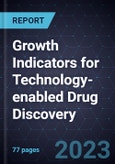Innovative Business Models across the TEDD Landscape Support the Emergence of AI-powered Therapeutics Providers
As the industry continues its innovation spree across novel small and large molecule therapies, such as RNA targeted small molecules, cell and gene therapies (CGT), and mRNA therapies, it is imperative for pharma sponsors to pursue partnerships to gain technology access, database generation and analysis, and pre-clinical and clinical research. Furthermore, the COVID-19 pandemic led to a serious disruption in pharma innovation, with companies not only looking for novel cures but also trying to leverage or repurpose existing therapies.
As a result of so many constant changes and disruptions, the industry is transforming, taking a convergence approach in which vendors are working together across all facets of drug discovery and development. The entire drug development ecosystem is expanding, with reliance on pure-play technology vendors, AI platform providers, academia and research centers, and outsourcing vendors such as CROs that can configure AI algorithms into their pre-clinical and clinical research portfolios.
Tech-enabled drug discovery (TEDD) vendors are successfully integrating into the pharma value chain by re-establishing their role as digital biotechnology companies that develop in-house therapeutic pipelines with specific focus on oncology, rare diseases, immunology, and anti-aging. Moreover, these TEDD vendors are focusing on both in-house capabilities (AI-powered therapeutics) and on providing platform-based and project-based partnerships with pharma players to support their therapeutic pipeline development.
AI integration into drug discovery remains on an upward trend, increasing almost 40% as of 2022, with a shift in focus from customized insights to intelligent solutions. The increasing volume and veracity of clinical and research data compels traditional providers to leverage enabling tools and technologies to provide fast, rational data-driven drug discovery solutions. For effective drug discovery of novel molecules, companies require uninterrupted access to databases (e.g., translational, molecular, longitudinal, foundational). TEDD vendors provide access to these databases and support de novo drug design owing to their robust computational capabilities. From data integration, analysis, and predictive modeling to real-time monitoring and quality control, AI-embedded applications across dry and wet labs can improve experimentations tied to not only cost and time efficiency, but also optimized workflows
This research service provides an overview of the global TEDD landscape, including analysis related to pharma industry participants and the leading drivers, restraints, and trends shaping the uptake of innovative technologies and platforms. The report takes a deep dive into the ongoing dynamics tied to technology implementation, from data collection to wet labs, that support a quicker, easier, and enhanced drug discovery process in much less time. Analysis includes insights into the overall funding scenario among key vendors and the geopolitical and macro-economic factors influencing that scenario. Based on ongoing industry trends, the analysis shortlists the unique business models that AI vendors in this space use to build in-house pipelines or to function as a strategic partner to pharma companies in support of their novel pipelines. In consideration of the business models and subsequent partnership models, the report benchmarks the top 5 competitors based on their proprietary pipelines (early to late stage), chemical and biological data capabilities, and ongoing partnerships. Also, detailed profiles of emerging and start-up TEDD vendors, with a focus on target discovery, validation, candidate discovery, lead identification and optimization, and preclinical research, amongst other areas are included.
Table of Contents
Companies Mentioned (Partial List)
A selection of companies mentioned in this report includes, but is not limited to:
- AbCellera Biologics
- BioAge Labs
- Evozyne
- Exscientia
- Iktos
- Insitro
- Neumora Therapeutics
- Peptilogics
- Recursion
- Schrödinger, Inc.








